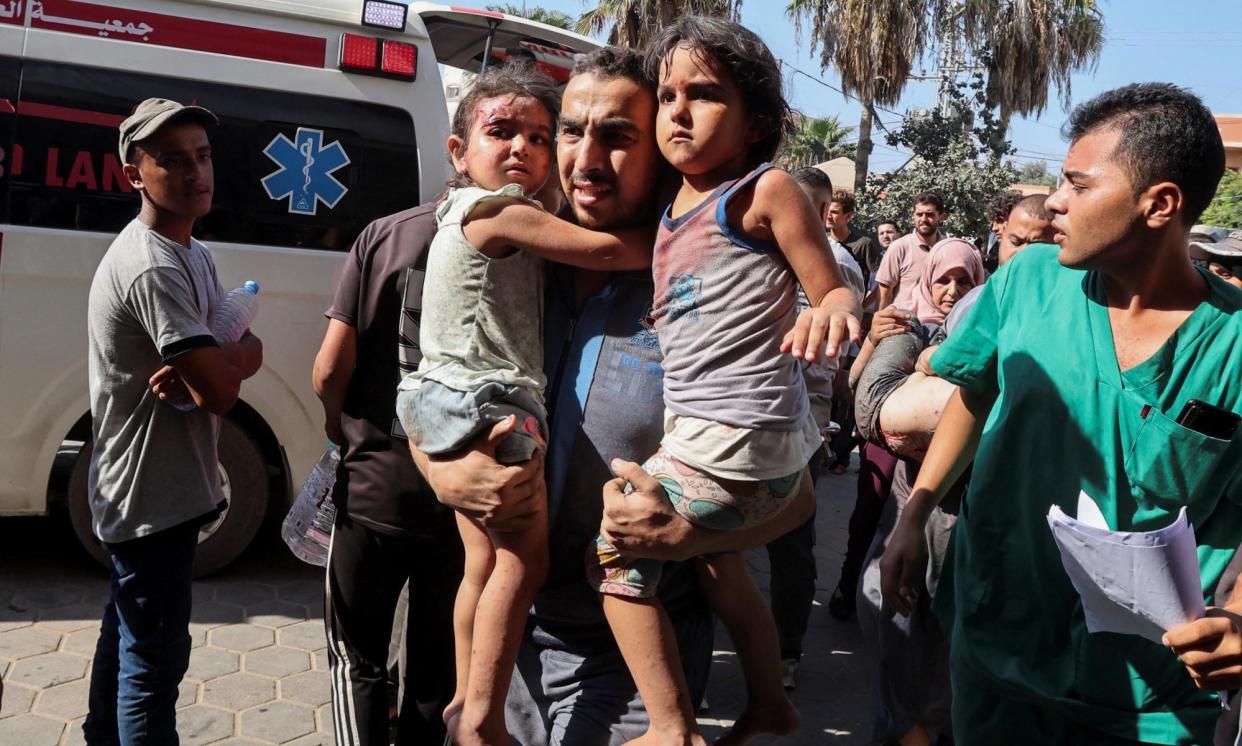Pediatric doctor describes tragedies in Gaza at first Palestinian human rights panel at DNC

A pediatric doctor who has treated patients in Gaza during the war told the Democratic party faithful about the horrors she witnessed there – children who lost their entire families, suffered debilitating injuries and amputations. So many left on their own that a term was coined: wounded child, no surviving family.
Dr Tanya Haj-Hassan was part of a panel centered on Palestinian human rights at the Democratic national convention, the first time the Democratic party has directly hosted an official panel on the topic. Haj-Hassan is one of dozens of medics who sent a letter to Joe Biden’s administration in July to share what they have witnessed while caring for people in Gaza.
Attendees, who numbered in the hundreds, wiped away tears as Haj-Hassan described what she saw and as other panelists detailed the losses they’ve experienced among family members in Gaza.
Haj-Hassan told of a young boy who came to the emergency room with half of his face and neck badly injured and said to her that because everyone he loved was in heaven, he wished he had died, too. She held the hands of children as they took their last breaths because there were no family members left to hold those hands.
Hala Hijazi, a party organizer on the panel who said she has had over 100 family members killed in Gaza, said she feels like she owes her family to speak out on Gaza. “My family’s dead, y’all. They’re dead. And I feel guilty because for 25 years I’ve been living my American dream while they are struggling,” she said.
The panel comes as Democrats convene in Chicago for a remade 2024 US election and rally around Kamala Harris, a more energetic choice than Biden was for many. Harris as the nominee gave “uncommitted” organizers – who launched a widespread anti-war protest vote during the primaries – hope that a ceasefire and changed Israel policy could be on the horizon. But they say they’re still waiting for Harris to articulate how she’s different from Biden on the issue.
Uncommitted wanted a prime spot on the main stage for Haj-Hassan to give voice to the Gaza war. So far, they have been granted the panel and a meeting space for press conferences, albeit far away from the center stage. One day into the convention, the organizers say they still want a main-stage speaking spot for a Palestinian American leader, something they have not heard back on from the DNC.
Still, they called the panel a move forward in the movement to convince the party and its delegates to support a ceasefire and arms embargo in Israel, a cause that drew thousands to the streets outside the convention and brought 30 uncommitted delegates to the Democratic convention after nearly 750,000 voters cast uncommitted ballots in the primaries.
Jim Zogby, the founder and president of Arab American Institute, said the panel represented the start of pressuring the party at the convention. “It is not the prize – the prize is a change in policy, that’s the prize, that’s what we want,” he said.
Panelists used the opportunity to issue a challenge to those few hundred gathered, many with ceasefire pins, shirts with the slogan “not another bomb” or in keffiyeh, to join cause at the convention and pressure Harris on Gaza.
The Democratic party platform does not include a call for an arms embargo or any differences from the Biden administration’s current policies. It says Biden has “been determined to broker an immediate and lasting ceasefire deal”, including the release of Israeli hostages, and says a “strong, secure, and democratic Israel is vital to the interests of the United States”. Party delegates will vote on approving the platform this week.
Some panelists said they believed Harris would and could change course and unite the Democratic party – a cause that they said is both morally correct but also politically sound, especially in a swing state like Michigan where the uncommitted movement was born.
“We need a kind of leadership from Kamala Harris that I know she’s capable of,” said former Michigan congressman Andy Levin.
Layla Elabed, a Michigan organizer of the national uncommitted movement, called on people in the crowd to stand if they had voted uncommitted, marched in protests, or believed there should be no difference between an Israeli or Palestinian child. She challenged Harris delegates to sign a petition to join the ceasefire cause. The crowd all stood, clapping and cheering.
“Congratulations, you’ve all just committed to making the Democratic party the home for Palestinian human rights,” she said.
